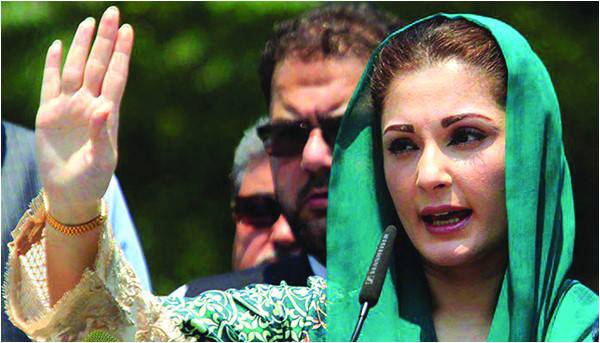
In 1997 a mob stormed the Supreme Court of Pakistan, forcing then Chief Justice Sajjad Ali Shah postpone a contempt hearing against then Prime Minister Nawaz Sharif. The tussle between PM House and the Supreme Court culminated in a division among the apex court judges. Consequently, Justice Shah had to leave, paving way for pro-Nawaz Justice Ajmal Mian to take over as chief justice.
Twenty-one years later the House of Sharif faces a tougher situation from the institution next door. Given the odds Sharif faces, it seems impossible to strongarm the judges this time. Chief Justice Mian Saqib Nisar is probably the strongest and toughest judge any political government could have after Chief Justice Iftikhar Muhammad Chaudhry.
He sent Nehal Hashmi, a Sharif loyalist, to prison on charges of contempt of court. The former Senator was served another contempt notice after he continued with his anti-judiciary tirade soon after his release from Adiala Jail.
Privatization minister Daniyal Aziz has also been charge-sheeted for contemptuous remarks in his several speeches and press conferences. The apex court will hear the case on March 26. Minister of state for interior Talal Chaudhry too faces similar charges.
Meanwhile, the former prime minister and his daughter Maryam Nawaz Sharif keep questioning the judiciary whenever and wherever they address public rallies. The Sharifs are thus seen as believing that the decisions against them were part of a conspiracy, hatched to first disqualify Nawaz Sharif as prime minister and then from active politics whatsoever.
The former prime minister pitted himself against the judiciary after last year’s disqualification on the grounds that he did not declare in his nomination papers a salary, which he was supposed to receive from his son’s company. The proceedings of the Panama Papers case ended in his disqualification as prime minister for holding an “Iqama” (or a work permit in the UAE). While disqualifying him, the court referred the original Panama Papers case to an accountability court for trial. The accountability court may take another two months to conclude the case and announce its judgement.
While one cannot attack the Supreme Court physically, as was seen in 1997, there is an attempt to engage in a war of the words. The PML-N is apparently trying to be provocative for reasons best known to its strategists.
The judges are well aware of adverse remarks made against them by the PML-N leadership. Last month, Chief Justice Saqib Nisar made his position clear. He vowed to protect democracy and dismissing the possibility of invoking a notorious “Doctrine of Necessity”

“We are being accused of accepting some cases, of being a part of an anti-democracy campaign, but the judges must not come under any pressure. Judiciary is not part of any planning and we will not let anyone suffer from injustice,” he told a lawyers’ convention.
While Daniyal Aziz, Talal Chaudhry and several other PML-N leaders are questioning the conduct of the judiciary in their public speeches, another PML-N leader, Siddiqul Farooq, took it a step further. He submitted a review petition in the apex court criticising the conduct of honourable judges in strong words.
In fact, the Supreme Court dismissed Mr Farooq from the chairmanship of the Evacuee Trust Property Board (ETPB), in January, on the grounds that he had exceeded his three-year tenure. The apex court had already expressed serious reservations on his performance as chairman. Last month, he filed a review petition against his dismissal.
In the review petition, Mr Farooq reminded the chief justice that it was former Prime Minister Nawaz Sharif who appointed him federal law secretary, in 1997, and then a judge of the Lahore High Court, in 1998.
“He (in 1996) used to attend the PML-N Secretariat to serve the cause of the PML-N under the leadership of Muhammad Nawaz Sharif, the then president of the PML-N and leader of the opposition in the National Assembly,” read the review petition.
Mr Farooq noted with disappointment that during the course of the hearing the honourable chief justice called him a “news collector.” Mr Farooq used to work as a press secretary to the prime minister.
Commenting on the anti-judiciary campaign by the PML-N leadership, senior Supreme Court lawyer, Wasim Sajjad, said that the conduct of a judge could not be discussed or criticized in public. “The rule is that once a judgement is announced it becomes public property. Whoever disagreeing with the judgement can comment on it or even criticize it. However, one cannot question the integrity of the judges who may have written that judgement,” he elaborated.
To a question, he said calling Imran Khan a “blue-eyed boy” of the judiciary was tantamount to contempt of court. The daughter of the former prime minister repeatedly implied that Mr Khan was given a huge reprieve from the apex court in an identical case, while her father was disqualified.
Syed Zafar Ali Shah, a senior advocate and a PML-N leader, agreed with Mr Sajjad. He said the judges couldn’t be questioned unlike their verdicts. “And the verdict can only be questioned once it is announced.”
When asked if Mr Farooq could discuss the past of the honourable chief justice, he said his appointment as federal law secretary was a part of his profile. “Facts cannot be changed. However, in the current scenario it signifies nothing,” he said.
Shahzad Raza is an Islamabad-based journalist. He tweets @OldPakistan_
Twenty-one years later the House of Sharif faces a tougher situation from the institution next door. Given the odds Sharif faces, it seems impossible to strongarm the judges this time. Chief Justice Mian Saqib Nisar is probably the strongest and toughest judge any political government could have after Chief Justice Iftikhar Muhammad Chaudhry.
He sent Nehal Hashmi, a Sharif loyalist, to prison on charges of contempt of court. The former Senator was served another contempt notice after he continued with his anti-judiciary tirade soon after his release from Adiala Jail.
Privatization minister Daniyal Aziz has also been charge-sheeted for contemptuous remarks in his several speeches and press conferences. The apex court will hear the case on March 26. Minister of state for interior Talal Chaudhry too faces similar charges.
The former prime minister and his daughter Maryam Nawaz Sharif keep questioning the judiciary whenever and wherever they address public rallies
Meanwhile, the former prime minister and his daughter Maryam Nawaz Sharif keep questioning the judiciary whenever and wherever they address public rallies. The Sharifs are thus seen as believing that the decisions against them were part of a conspiracy, hatched to first disqualify Nawaz Sharif as prime minister and then from active politics whatsoever.
The former prime minister pitted himself against the judiciary after last year’s disqualification on the grounds that he did not declare in his nomination papers a salary, which he was supposed to receive from his son’s company. The proceedings of the Panama Papers case ended in his disqualification as prime minister for holding an “Iqama” (or a work permit in the UAE). While disqualifying him, the court referred the original Panama Papers case to an accountability court for trial. The accountability court may take another two months to conclude the case and announce its judgement.
While one cannot attack the Supreme Court physically, as was seen in 1997, there is an attempt to engage in a war of the words. The PML-N is apparently trying to be provocative for reasons best known to its strategists.
The judges are well aware of adverse remarks made against them by the PML-N leadership. Last month, Chief Justice Saqib Nisar made his position clear. He vowed to protect democracy and dismissing the possibility of invoking a notorious “Doctrine of Necessity”

“We are being accused of accepting some cases, of being a part of an anti-democracy campaign, but the judges must not come under any pressure. Judiciary is not part of any planning and we will not let anyone suffer from injustice,” he told a lawyers’ convention.
While Daniyal Aziz, Talal Chaudhry and several other PML-N leaders are questioning the conduct of the judiciary in their public speeches, another PML-N leader, Siddiqul Farooq, took it a step further. He submitted a review petition in the apex court criticising the conduct of honourable judges in strong words.
In fact, the Supreme Court dismissed Mr Farooq from the chairmanship of the Evacuee Trust Property Board (ETPB), in January, on the grounds that he had exceeded his three-year tenure. The apex court had already expressed serious reservations on his performance as chairman. Last month, he filed a review petition against his dismissal.
In the review petition, Mr Farooq reminded the chief justice that it was former Prime Minister Nawaz Sharif who appointed him federal law secretary, in 1997, and then a judge of the Lahore High Court, in 1998.
“He (in 1996) used to attend the PML-N Secretariat to serve the cause of the PML-N under the leadership of Muhammad Nawaz Sharif, the then president of the PML-N and leader of the opposition in the National Assembly,” read the review petition.
Mr Farooq noted with disappointment that during the course of the hearing the honourable chief justice called him a “news collector.” Mr Farooq used to work as a press secretary to the prime minister.
Commenting on the anti-judiciary campaign by the PML-N leadership, senior Supreme Court lawyer, Wasim Sajjad, said that the conduct of a judge could not be discussed or criticized in public. “The rule is that once a judgement is announced it becomes public property. Whoever disagreeing with the judgement can comment on it or even criticize it. However, one cannot question the integrity of the judges who may have written that judgement,” he elaborated.
To a question, he said calling Imran Khan a “blue-eyed boy” of the judiciary was tantamount to contempt of court. The daughter of the former prime minister repeatedly implied that Mr Khan was given a huge reprieve from the apex court in an identical case, while her father was disqualified.
Syed Zafar Ali Shah, a senior advocate and a PML-N leader, agreed with Mr Sajjad. He said the judges couldn’t be questioned unlike their verdicts. “And the verdict can only be questioned once it is announced.”
When asked if Mr Farooq could discuss the past of the honourable chief justice, he said his appointment as federal law secretary was a part of his profile. “Facts cannot be changed. However, in the current scenario it signifies nothing,” he said.
Shahzad Raza is an Islamabad-based journalist. He tweets @OldPakistan_

